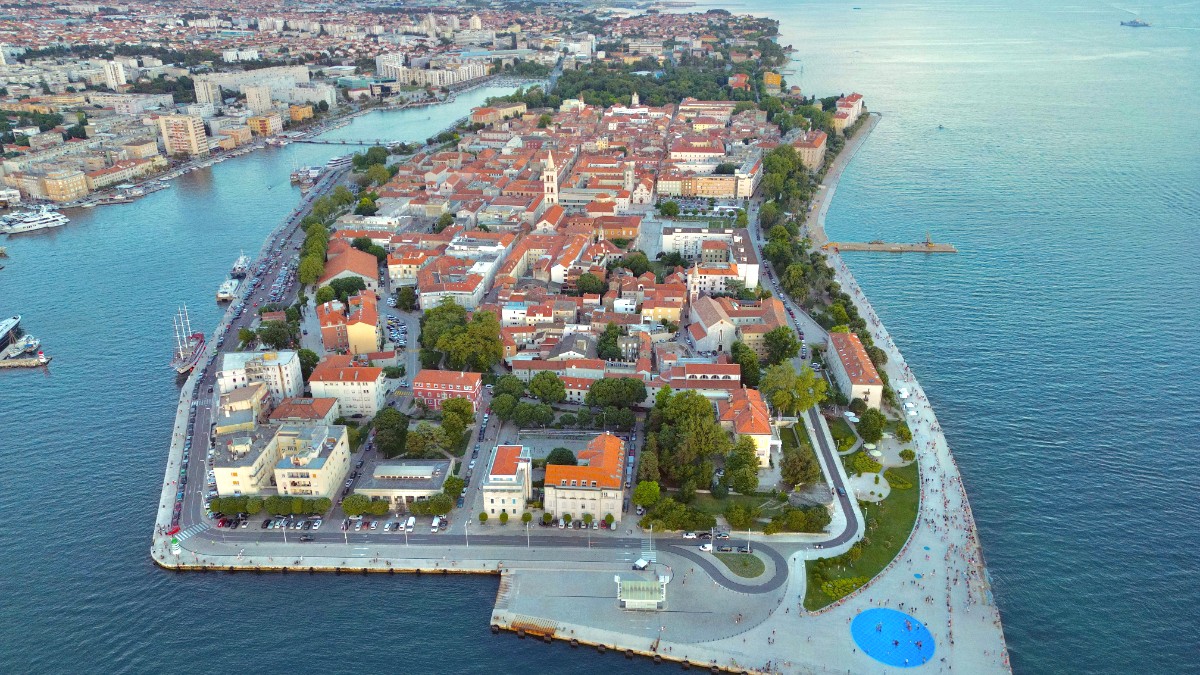
Dalmatia, Croatia
The city experiences a Mediterranean climate, characterized by hot, dry summers and mild, wet winters.
Summer months bring the warmest weather. Average daily temperatures range from 25°C to 30°C, often reaching above 30°C in July and August. Sea temperatures are excellent for swimming, staying between 23°C and 26°C. Rainfall is minimal, and humidity remains moderate. Days are long, sunny, and ideal for beach activities and evening strolls.
Ideal timing for specific activities: For beach and swimming, plan June to September. Sightseeing and walking are pleasant in May, June, September, and October. Hiking and cycling are good in April, May, early June, September, and October. Exploring national parks (e.g., Krka, Paklenica) is best during the shoulder seasons for fewer crowds and comfortable temperatures.
Peak tourism, highest prices.
Sea is warmest, excellent for water sports. City buzzes with lively atmosphere. All attractions and services operate fully. Numerous events and festivals with entertainment.
Accommodation and flight prices reach peak. Crowds gather at popular sites and beaches. Very hot weather; extensive sightseeing may be uncomfortable.
Pleasant temperatures, fewer crowds.
Temperatures are pleasant for sightseeing. Sea remains warm for swimming. Fewer crowds compared to peak summer, yielding a more relaxed experience. Prices more reasonable.
Some services might have reduced hours in late October. Sea might feel cooler for swimming in early May and late October.
Lowest prices, minimal tourists.
This period sees the lowest prices for accommodation and flights. Very few tourists, an opportunity to experience local life and culture. Weather stays mild compared to continental Europe.
Many tourist businesses close. Ferry schedules to islands limited. Temperatures cooler, higher chance of rain and strong Bura winds, which may disrupt travel plans.
Croatia's entry requirements match Schengen regulations, as it became part of the Schengen Area on January 1, 2023. Plan your entry carefully to meet all necessary conditions.
Citizens of the United States, Canada, United Kingdom, Australia, New Zealand, EU countries, and many other nations do not need a visa for tourist stays up to 90 days within a 180-day period. This period applies to the entire Schengen Area.
Citizens of countries not on the visa-free list need a Schengen visa. Apply at the embassy or consulate of the main Schengen country of your visit. The process typically includes an appointment, valid passport, photos, accommodation proof, itinerary, travel insurance, and financial proof.
For stays exceeding 90 days, for purposes like work, study, or family reunification, a long-stay visa is in order. Application is more extensive, varying by purpose. Apply directly with Croatian authorities.
Valid for at least three months beyond intended departure date from Schengen Area. At least two blank pages. Check expiration date well before trip.
Immigration officials may request proof of your departure from the Schengen Area, like a confirmed return flight ticket or an onward ticket. This shows your planned exit.
Carry confirmation of your hotel bookings or an invitation letter. Demonstrate you possess adequate financial means to cover your stay.
Croatia's official currency is the Euro (€), adopted on January 1, 2023.
The Euro (€) is the standard for all transactions.
Tipping is not mandatory in Croatia but appreciated for good service.
Croatia has a public healthcare system; private clinics also available. Tap water is safe. Zadar generally very safe with low crime rates.
Keep both physical and digital copies of all important papers. Your documents support a smooth journey.
Your documents are your to a smooth journey. Always have them readily available.
Physical and digital copies ensure backup if one set is lost or damaged. Keep copies in separate locations for added security.
Carry vaccination records and any health documentation, especially for prescription medications. A doctor's letter explaining prescriptions proves useful.
Vaccination card and doctor's letters.
Prescriptions in original packaging.
Keep printed and digital copies of all reservations (accommodation, flights, tours). Create an emergency contact list (family, doctor, embassy).
All booking confirmations.
Emergency contact list, readily accessible.
If applicable, carry your ISIC card (International Student Identity Card) for student discounts, or other relevant identification for senior or press discounts.
Savings on attractions and transport.
Without ID, no discount. Ensure validity.
| Document Type | Purpose | Availability |
|---|---|---|
| Passport | Entry/Exit to Croatia/Schengen | Physical & Digital copies |
| Travel Insurance | Medical emergencies, trip protection | Policy details, emergency numbers |
| IDP/Driver's License | Driving in Croatia | Physical copy |